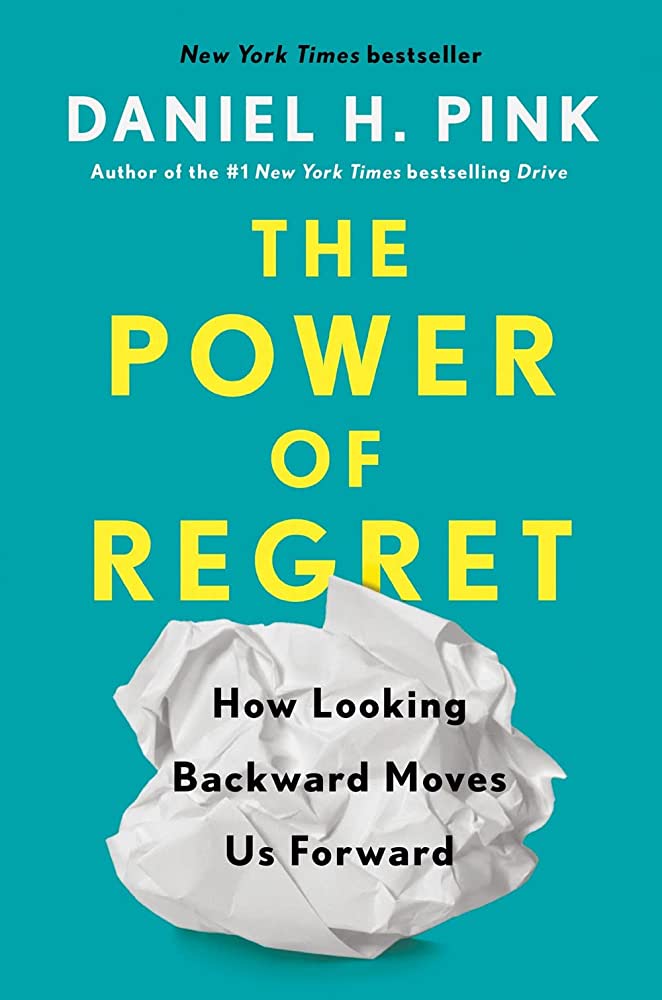Andrew Studdert-Kennedy: “The Power of Regret” by Daniel Pink

The American social psychology author, Daniel Pink, has written a number of best-selling books concerning human motivation, performance and innovation. The Power of Regret- How looking Backward Moves Us Forward continues the genre and, filled as it is with both anecdote and analysis, is an engaging and enjoyable read. A wide range of people will benefit from reading it, not just those who have to deal with regret on the part of both themselves and those for whom they are responsible in a business context.
Noting that there are over 50 books in the US Library of Congress with the title, No Regrets, Pink aims to challenge the US obsession with positivity and reclaim regret not just as an unavoidable part of mature human living but also as a means of improving decision making and performance.
The book draws on Pink’s own work with the American Regret Project and the World Regret Survey, which between them have collected and examined more than 20,000 regrets from around the world.
Pink identifies Four Core Regrets:
Foundation regrets stem from our failure to build a stable platform for our lives; the schoolwork we shirked, the debt we accrued, the drinks we enjoyed. Excess, too much or too little, often features. A simple summary of a Foundation regret is If only I had done the work.
Boldness regrets, as the name suggests, concern the chances we didn’t take, the courage we lacked. Evidence suggests that past inactions that can haunt us rather more than a past action – If only I had taken the risk.
The third category, Moral regrets, are those times when we know we have behaved badly – deceiving a spouse, cheating in a test. At the time of the act, we may convince ourselves it wasn’t so bad, but over the passage of time, we see that this is not the case. In this category (the smallest of the four) it is a past action rather than inaction that troubles us – if only I had done the right thing.
The final category (the largest of the four) is Connection regrets, which “arise from relationships that have come undone or remain incomplete” (page133). What Pink has in mind here are friendships allowed to wither, kindnesses that were not shown or interest in other people that was not expressed – If only I had reached out.
Looking further at the four regrets, Pink suggests that each of them “reveal a need and yield a lesson” (page 96). Foundation regrets, he argues reveal the need for stability whilst the lesson they yield is “Think ahead. Do the work. Start now” (page 96). Boldness regrets reveal the human need for growth and the lesson they yield “Speak up. Ask him out. Take that trip. Start that business” (page 111). Moral regrets reveal the need for goodness, the lesson is “when in doubt do the right thing” (page 129). Finally, Connection regrets reveal the need for love and the lesson they yield is “to do better next time … and (if the door is open) do something now” (page146)
Having analysed regret in this way, the final section of the book, Regret Remade “describes how to turn the negative emotion of regret into a positive instrument for improving your life”. (page 15)
The advice here consists of taking steps to undo a particular action, for example by making an apology, and where this isn’t possible to seek a silver lining to the regret. This entails being grateful that the mistake wasn’t worse and saying to ourselves “At least…” That way, writes Pink, “At Leasts can turn regret into relief” (page 165).
When regrets do threaten to become overwhelming, Pink suggests that talking about what is on our mind, not being too harsh on ourselves and putting the anxieties in perspective, through imagining others confronted with the same challenge, can be beneficial. “Looking backward can move us forward, but only if we do it right. The sequence of self-disclosure, self-compassion and self-distancing offers a simple yet systematic way to transform regret into a powerful force for stability, achievement and purpose” (page 182)
Whilst regret is a retrospective emotion, Pink describes the way in which by anticipating regret most effectively, what he calls optimizing regret, we can improve our decision making and hone our strategy for pursuing the good life.
As this outline of the book suggests, there are plenty of instances when it seems to be telling us things we already know. In some ways this is its strength. For it is a book about human behaviour and we recognize ourselves in it. Accordingly, the selected survey samples and different stories that Pink uses as illustrations are satisfying to read because we feel we know in advance what they will tell us. We find ourselves in the story.
At the same time, some of the analysis of the regrets and the responses to them can seem rather laboured. Mistakes are an everyday part of life, and we learn from them with varying degrees of effectiveness. Sometimes we will never do such a thing again whilst at other times we find ourselves being repeat offenders.
Some readers will warm to the systematic approach that Pink outlines and may change their behaviour accordingly. Others will recognize themselves in the illustrations he offers and carry on as before.
Pink focusses on the positive power of regret and, although he is aware of regret’s negative power, the book could have benefitted from further exploration of this. A sermon in which the preacher said, “To regret something is to lose the battle a second time” comes to mind. What lies behind this claim is not a refusal to learn from mistakes so much as an acceptance of who we are and where we find ourselves.
The four core regrets that Pink outlines all express themselves through “if only” and the danger of this is that it could lead to someone saying “if only I were someone else”. For there lies behind Pink’s writing an unspoken assumption that we all desire effective, high achieving and purposeful lives which are to be achieved through a combination of self-will and self-discipline. There must surely come a time when, for example, the person who has failed to be as bold as they might have been needs not just to accept that this is who they are but delight in it. In other words, their value and distinctiveness lie outside the parameters which are so often laid down by others.
Perhaps as a priest, I was bound to find this a short-coming of a book which does indeed reclaim regret and seeks to improve human living but does so from a secular perspective.
“The Power of Regret” by Daniel Pink was published in Great Britain in 2022 by Cannongate Books (ISBN-13: 978 1 83885 706 6), 240pp.
 Revd Canon Andrew Studdert-Kennedy is Team Rector & Vicar of St Andrew’s, Uxbridge.
Revd Canon Andrew Studdert-Kennedy is Team Rector & Vicar of St Andrew’s, Uxbridge.
